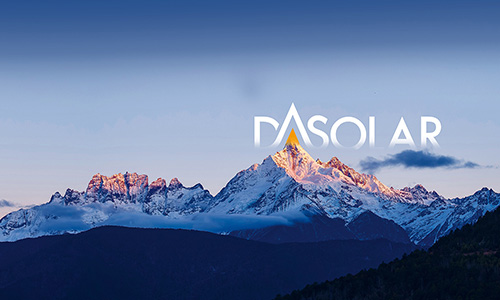DAS Solar N-type modules are highly resistant to extreme weather
2024-01-08
People's lives were greatly disrupted in many areas during the winter months due to sharp drops in temperature and snowfall. Solar power generation equipment that requires extended outdoor operation, such as PV modules, may face harsh environmental challenges and extreme weather conditions during their 25-year service life. To evaluate the N-type modules' ability to withstand adverse weather throughout their entire lifecycle, DAS Solar conducted comprehensive and rigorous tests, including wet freezing tests, wet leakage current tests, static and dynamic mechanical load tests, as well as hail tests.
To evaluate the strength and stability of N-type modules under extreme weather conditions, DAS Solar conducted static and dynamic mechanical load tests on the modules. A positive and negative pressure of 5400 Pa and 2400 Pa was applied to the frontsheet and backsheet of the modules in the static mechanical load test. A three-cycle study was conducted to observe the deformation, damage, and changes in power output and performance of N-type modules. Dynamic mechanical load tests simulate the effects of wind and seismic activity on the modules. Using more than 1000 cycles, 1500 Pa ± 100 Pa were applied sequentially to the frontsheet and backsheet of the module in order to observe its performance. It was determined that DAS Solar N-type modules had an undamaged exterior, outstanding performance, and were stable and reliable following rigorous tests.
Hailstorm, a frequently occurring natural disaster, presents a substantial threat to PV modules due to its formidable impact force, creating significant safety risks. To assess the impact resistance of N-type modules, DAS Solar conducted a 35mm hail load test. The experiment utilized large-sized ice balls weighing 20.7g with a diameter of 35mm, impacting the module surface at a velocity of 27.2m/s. The power attenuation of the DAS Solar N-type modules was only approximately 0.07%, significantly below the IEC requirement of 5% after enduring 11 intense impacts. There were no internal or external defects, and no wet leakage current was detected.
In addition, DAS Solar conducted a wet leakage test on N-type modules to evaluate insulation performance under humid conditions. Water was sprayed on the module's lead-out terminals under 1500V direct current, while the module edges were immersed in water at the same time and the insulation resistance exceeded 1.9 GΩ, surpassing the requirements set by the IEC. There were no signs of insulation breakdown or surface fracture after experimentation. In parallel, to test the durability and stability of N-type modules in harsh environments, modules were placed inside a test chamber and exposed to high temperatures, high humidity, and ultra-low temperatures. As a result of testing, no intermittent circuit interruptions or leakages were observed.
These tests were completed in the DAS Solar PV Lab. As a leader in N-type technology, DAS Solar is dedicated to continuous exploration and rigorous research in N-type technology, consistently surpassing industry standards in cell and module efficiency. DAS Solar's PV lab had obtained CNAS lab certificate, TÜV SÜD's TMP certificate and TÜV Nord's CTF witness lab qualification, providing further evidence of DAS Solar's strength and enhance its industry-leading advantage in product quality.

The comprehensive and rigorous tests mentioned above validate the high reliability of DAS products in resisting extreme weather conditions. DAS subjects every module to intensive quality control testing under IEC standards. Triple EL tests are performed on each module throughout the production process, ensuring the production of high-quality modules. DAS Solar will offer global customers a reliable assurance of long-term optimal value in the future.






 浙公网安备33080302000236
浙公网安备33080302000236